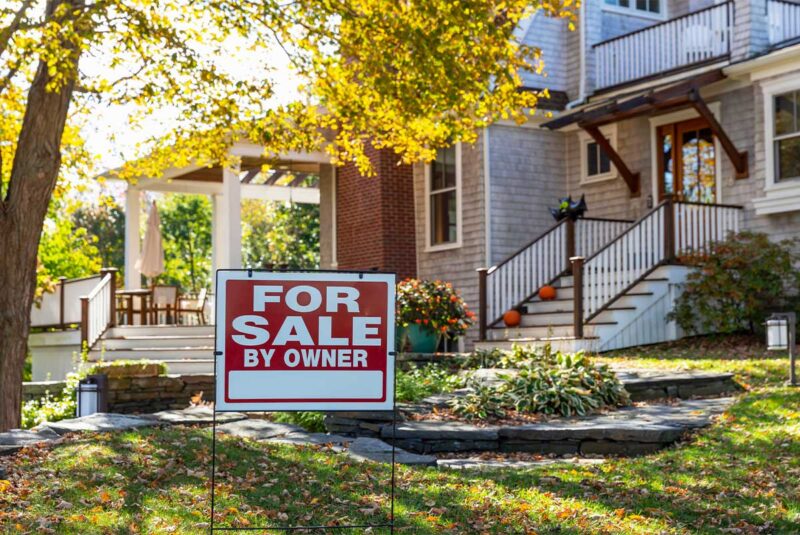Ready To Buy a Home?
Get Approved to Buy a Home
Rocket Mortgage® lets you get to house hunting sooner.
So you’re thinking of buying a house. Congratulations! This is an exciting time in your journey, and it represents a great opportunity. But purchasing a property doesn’t come without risk.
To help, we’ve put together a list of 10 common first-time home buyer mistakes to avoid. While some say experience is the best teacher, when it comes to home buying, we prefer the Warren Buffet school of thought: “It’s good to learn from your mistakes. It’s better to learn from other people’s mistakes.”
10 Common Home Buying Mistakes
Explore Your Mortgage Options
What are you looking to do?
People make mistakes for many reasons, but first-time home buyers tend to make them due to:
- Lack of experience
- Lack of preparation
- Lack of professional help
- Emotional decision making
- Rushing the process
You’ll find these 10 most common missteps are a result of at least one of those causes – if not a combination of a few.
1. Not saving enough for a down payment
More than one in four prospective home buyers cite difficulty saving for a down payment as an obstacle to purchasing a home.[1] So if you’re having trouble saving, you certainly aren’t alone.
However, the bigger your down payment, the less money you’ll have to borrow, the lower your monthly mortgage payment will be and the less interest you’ll pay over the life of the loan. You’ll also accelerate the rate at which you build equity in your home.
It takes discipline to budget and save up for a substantial down payment. While you don’t necessarily have to hit the often-cited 20% figure, it’s typically in your best interest to make as much of a down payment as you can.
You don’t have to settle for the minimum your lender will accept, and if you do, you might regret it.
2. Not getting preapproved
Getting preapproved has several advantages. First, you get a deeper understanding of the mortgage process, including all the factors your lender will review – like your credit history and debt-to-income (DTI) ratio.
You’ll need to provide documentation to your lender as part of the preapproval process, which will also speed up the underwriting process. This should give you a more concrete idea of how much house you can afford, which can help you narrow down your house search.
Getting preapproved will also make your offers stronger. In fact, many listing agents won’t even consider an offer if you aren’t preapproved. You don’t want to miss out on your dream home because you skipped this step.
3. Not shopping lenders
Shopping for a loan can cause a little cognitive dissonance, especially for rookie home buyers.
On one hand, it feels like the lender has all the power – since you’re asking for a loan and need to meet their requirements. But on the other hand, you’re a consumer paying for a service. Don’t forget to focus on that second part. They’ll make money off your loan.
Here are some benefits to shopping lenders that you could miss out on:
- Finding the best rates
- Discovering more loan options
- Negotiating better terms
- Receiving better customer service
4. Not getting the right mortgage
Part of why it’s important to choose the right lender is so you can find the right mortgage. There are a lot of options to choose from, including government-backed mortgages and programs specifically designed for first-time home buyers.
The type of mortgage you choose will impact almost every aspect of the loan, including the interest rate you pay, the down payment you owe and the length of the loan.
There’s a specific mortgage that will work best for your circumstances. Take the time to work with a professional and make sure you’re choosing the best one.
Need Mortgage Help?
New home, second home, refinancing, we’ve seen it all. Whatever your goals, expert help is just a click away.
5. Not shopping real estate agents
You should also take the time to interview multiple real estate agents. They’ll be an invaluable resource, advising you on everything from current market conditions to your initial offer and any negotiations with the seller.
By interviewing multiple agents, you’ll ideally find someone who understands your needs and matches your communication style. Buying a house is an involved process that goes far beyond writing up an offer letter. Finding an agent to advocate for your best interests makes a huge difference.
6. Not factoring in closing costs
Many first-time buyers forget to account for closing costs when putting in an offer. Closing costs usually account for 2% – 5% of the loan amount.[2] For a $300,000 loan, that would be $6,000 – $15,000 in closing costs.
That’s a significant amount of cash, especially if you haven’t planned for it. This can cause a lot of stress, budgeting issues and could cause the loan application to be denied if you’re unable to pull the funds together.
7. Buying more house than you can afford
Remember, even after you make the down payment and pay closing and moving costs, you’re still responsible for the mortgage payment every month. This can overwhelm new homeowners who overextended themselves.
House poor is the term for homeowners who have purchased homes they can’t afford. According to recent data from Consumer Affairs, seven in 10 homeowners consider themselves house poor. Among millennials, that number increases to nearly 80%.[3] This is becoming an increasingly common problem.
Take the time to calculate how much house you can afford to ensure you don’t end up in the same uncomfortable position.
8. Skipping the home inspection
Seller’s disclosures are important, but they don’t reveal everything. It’s critical to get a home inspection for several reasons.
- Safety: Getting an inspection can reveal safety hazards, like mold or pests, that you may not have found otherwise.
- Negotiating power: If the inspection reveals hidden issues, you can negotiate with the seller to have them make repairs. By skipping the inspection, you miss the opportunity to have them fix issues for you.
- Surprise costs: If you don’t get an inspection, you might be surprised when the roof starts to leak or other potentially expensive issues occur. Even if the seller doesn’t fix them, you’ll at least be aware of issues so you can start budgeting to fix them yourself.
9. Neglecting home maintenance and repair costs
Once you’ve closed on the home, the responsibility for maintaining it falls squarely on you. That means you’re responsible for fixing things that break – which they will. Many financial experts recommend budgeting 1% – 2% of your home’s purchase price for maintenance costs in the first year.
It can be tempting to neglect issues when they pop up, especially if you spent all of your money to get the home. This can be dangerous from a safety perspective, and untended issues could negatively impact your home’s potential resale value down the line.
This is one of the biggest purchases you’re likely to make in your lifetime. Make a plan to maintain it.
10. Forgetting you have to live there
We don’t mean to be glib. So much goes into purchasing a home that sometimes people forget to consider what their daily lives will look like once they’re actually living there.
For example, if you have to commute to work, how far will you drive every day? How far is it to the nearest grocery store or your favorite grocery store? Will you be able to keep your hair stylist and doctor, or are they too far away? While these things seem small individually, they can add up to a lot of unexpected changes.
Less Common Mistakes To Avoid
Our top 10 mistakes could happen to any first-time buyer. However, there are some other, less common mistakes you should also be aware of.
Not understanding HOA covenants
If your home has a homeowners association (HOA), your property will be subject to their covenants or rules. HOA membership isn’t optional in most cases. So if you buy a property in an HOA, you’ll be required to follow the rules.
This can limit renovations you’re allowed to make, how your lawn can look and how you decorate your home’s exterior. Additionally, you’ll likely owe an HOA membership fee, which can have a drastic impact on your monthly mortgage payment – especially if the community has a lot of amenities.
Not considering flood zones or natural disasters
Just because a house is located in a flood zone, or other natural disasters – like hurricanes or wildfires – are common, doesn’t necessarily mean you shouldn’t purchase the home.
However, you should absolutely do your due diligence beforehand. Understand what the unique risks are to the property and how they’ll impact your insurance premiums. Find out what’s covered by your homeowners insurance and what’s not.
If you decide to proceed with purchasing the home, your offer should reflect these additional considerations. Your real estate agent will be an important resource during this process.
Getting pressured to buy mortgage discount points
There are different ways to buy down an interest rate, including buying mortgage points. When interest rates are high, more people consider these options than when interest rates are low.
It’s possible to save money over the life of the loan by buying points, but it takes time to do so. You should calculate your breakeven point to understand how long you’ll need to keep your mortgage to see any financial benefit. If you plan to sell your house or refinance when rates come down, you’ll end up losing money on the deal if you do it too soon.
Not considering zoning laws
This is especially important if you’re considering buying a fixer-upper or if you want to operate a business from your property, like a home bakery. What does the law allow you to do?
For example, if you buy a historic home, you might find that repairs and renovations you’d like to make are limited. There might be prohibitions on things like changing the paint color and adding to the home – e.g.,not allowing a second story can be common in these cases.
Similarly, if you want to run a home business, make sure your city and county allow you to do so before making an offer. Going back to our home bakery example, different states have various laws about baking with pets in the home. If you’re a home baker with a cat, your business could become illegal simply by crossing state lines.
Practical Tips for Avoiding These Mistakes
If that seems like a lot of mistakes to remember to avoid, don’t worry. Most of them stem from common root causes, so here are some tips that should help you avoid them.
- Do your research: Take the time to understand your finances and hone in on how much house you can afford. This will help you understand which mortgages to inquire about, what houses to look at and how much of a down payment you need to budget for.
- Ask for professional help: Take time to shop lenders and real estate agents. Once you’ve found ones you feel comfortable with, lean on them. Ask them both all the questions you can think of. This is your first time going through the process, but they do it all the time. Use their expertise to your advantage.
- Take your time: House hunting can feel like an all-consuming race. But don’t rush. You’ll be paying for the home years after the adrenaline fades away. Sleep on things when you can. This will also help you avoid making overly emotional decisions you might come to regret later.
Final Thoughts on First-Time Home Buyer Mistakes
It’s impossible to know everything as a first-time home buyer, and it’s okay if you make a mistake. By taking the time to be as prepared as possible and leaning on trusted professionals, you should avoid making the most costly ones.
The Short Version
- Not saving enough for a down payment, not getting preapproved and not picking the right mortgage are common financial mistakes first-time home buyers make
- First-time buyers should also shop multiple mortgage lenders and real estate agents before deciding who to partner with
- To avoid making common first-time home buyer mistakes: do your research, ask for professional help and don’t rush the process
National Association of REALTORS®. “2022 Obstacles to Home Buying.” Retrieved June 2023 from https://cdn.nar.realtor//sites/default/files/documents/2022-obstacles-to-home-buying-04-12-2022.pdf?_gl=1*4ft7q9*_gcl_au*MTczMDE1MDA1Ni4xNjg0MjY3MDc2
National Association of REALTORS®. “New Owners Fazed by ‘Hidden’ Costs of Homeownership.” Retrieved June 2023 from https://www.nar.realtor/magazine/real-estate-news/new-owners-fazed-by-hidden-costs-of-homeownership
Consumer Affairs. “What Is House Poor?” Retrieved June 2023 from https://www.consumeraffairs.com/finance/what-is-house-poor.html




